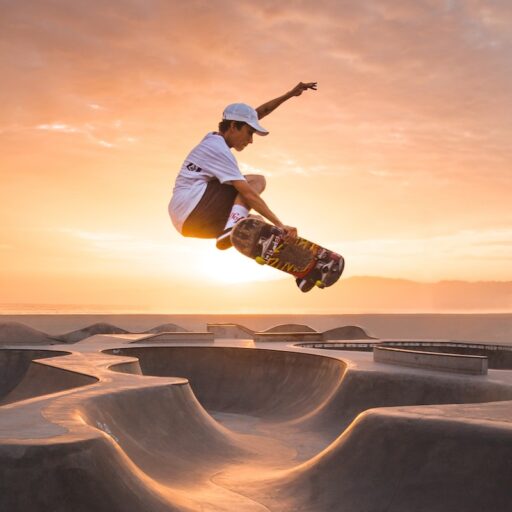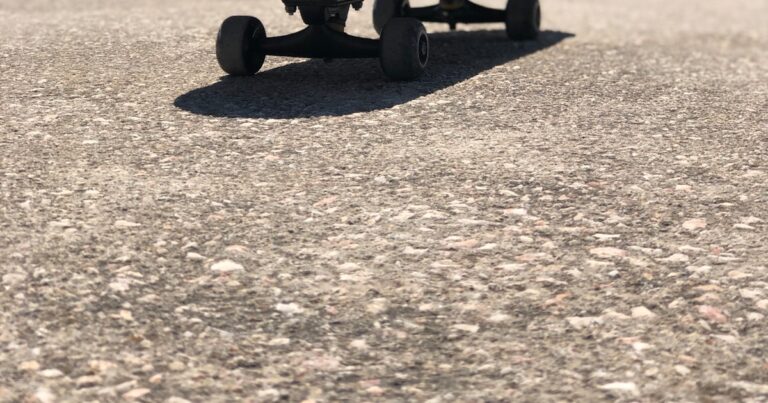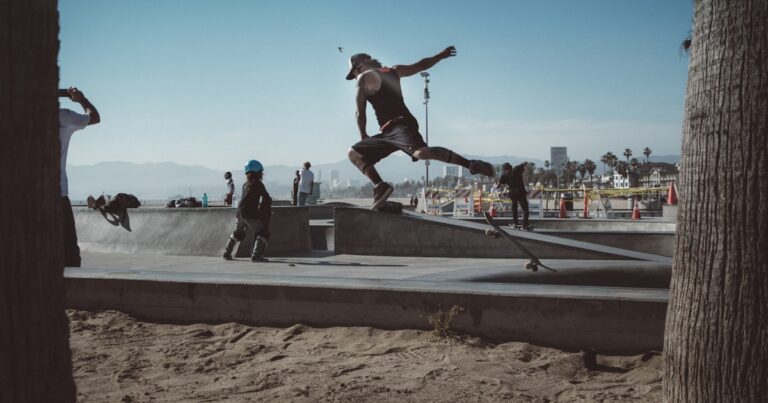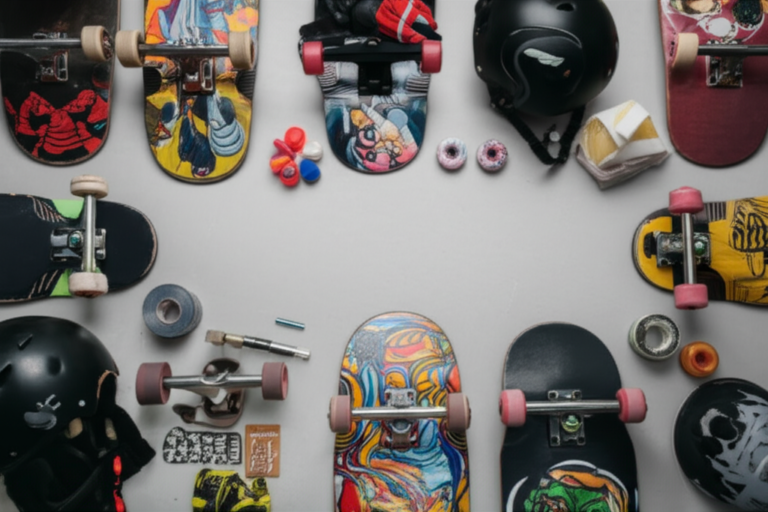Support our educational content for free when you purchase through links on our site. Learn more
7 Skateboard Brands Leading the Eco-Friendly Revolution (2025) 🌿
Skateboarding has always been about freedom, creativity, and pushing boundaries—but what if your ride could also push the planet toward a greener future? If you’ve ever wondered, “Are there any skateboard brands that focus on sustainable or eco-friendly practices?”, you’re in for a treat. We’ve scoured the scene, tested decks, and talked to insiders to bring you the ultimate lowdown on the brands that are not just talking green but truly living it.
From bamboo-powered decks that grow faster than your average maple, to boards made from recycled ocean plastics, the eco-skate movement is no longer niche—it’s reshaping the industry. Curious which brands combine killer performance with genuine sustainability? Stick around, because we’re breaking down the top 7 innovators, revealing their secret sauce, and sharing insider tips on how you can ride greener without sacrificing style or pop.
Did you know that traditional skateboard manufacturing can contribute to deforestation and plastic waste? But thanks to pioneers like Arbor Collective and Bureo, you can now shred knowing your board supports reforestation or cleans up ocean pollution. Ready to roll into the future of skateboarding? Let’s dive in!
Key Takeaways
- Sustainable skateboards use renewable materials like bamboo and reclaimed wood, paired with bio-based resins.
- Top brands like Arbor Collective and Bureo lead the charge with transparent, certified eco-friendly practices.
- Eco-friendly gear now rivals traditional boards in performance, durability, and style.
- Sustainability extends beyond decks to wheels, trucks, grip tape, and apparel.
- You can make a difference by maintaining gear, recycling old boards, and supporting ethical brands.
Ready to shop green? Check out our recommended eco-friendly skateboard brands and gear to start your sustainable shred today!
Table of Contents
- ⚡️ Quick Tips & Eco-Skate Facts You Need to Know!
- 🌍 The Green Wave: A Brief History of Eco-Conscious Skateboarding
- 🔬 Decoding ‘Green’: What Makes a Skateboard Truly Eco-Friendly?
- 🌱 Our Top Picks: Skateboard Brands Paving the Way for a Greener Ride
- Arbor Collective: Roots in Sustainability & Reforestation
- Bureo: From Ocean Waste to Rad Rides
- Globe Brand: Regenerative Practices & Eco-Conscious Collections
- Loaded Boards: Bamboo, Bio-Epoxy & Beyond
- Bambus Skateboards: The Strength of Sustainable Bamboo
- Jucker Hawaii: Aloha to Eco-Friendly Cruising
- Other Notable Mentions & Emerging Brands
- ♻️ Beyond the Board: Eco-Friendly Components, Apparel & Accessories
- 🛠️ Your Green Grind: How YOU Can Be a Sustainable Skater
- 🚧 The Bumps in the Road: Challenges of Sustainable Skateboarding
- 🔮 Future Forward: Innovations Shaping Sustainable Shredding
- ✅ Rolling Towards a Greener Future: Our Final Thoughts
- 🔗 Recommended Resources for the Eco-Skater
- ❓ Your Burning Questions Answered: Eco-Skate FAQ
- 📚 Dive Deeper: Our Trusted Sources
⚡️ Quick Tips & Eco-Skate Facts You Need to Know!
Hey there, eco-conscious skater! 🌱 Before we dive deep into the leafy lanes of sustainable skateboard brands, here are some quick-fire facts and tips to kickstart your green grind:
- Skateboarding is zero-emission transportation! Unlike cars or scooters, your board leaves no carbon footprint while you cruise. (Source: Skateboards.com)
- Bamboo decks grow faster than maple and require less water and pesticides, making them a top eco-friendly choice.
- Look for FSC certification on decks — it guarantees wood is responsibly sourced from well-managed forests.
- Recycled urethane wheels are becoming a thing — some brands even use recycled chewing gum! 🍬♻️
- Avoid greenwashing! If a brand’s sustainability claims are vague or buried in fine print, it’s probably fluff. (More on this in The Bumps in the Road)
- Extend your gear’s life by regular maintenance and repairing instead of tossing it out.
- Repurpose old decks into furniture or art — your board’s second life can be just as rad as the first.
We’ll unpack all these points and more, so hang tight! Ever wondered if your favorite brand is truly green or just wearing a leafy mask? Let’s find out together.
🌍 The Green Wave: A Brief History of Eco-Conscious Skateboarding

Skateboarding and sustainability might seem like an odd couple at first glance — after all, traditional decks are made from 7-ply maple glued with petroleum-based resins, and wheels are plastic-heavy. But the tide has been turning since the mid-90s.
Roots of Sustainability in Skateboarding
- Arbor Collective, founded in 1995, was one of the first brands to seriously commit to environmental responsibility. They pioneered using sustainably harvested wood and funding forest preservation projects. (Arbor Collective Sustainability)
- The rise of bamboo decks and bio-based resins in the 2000s showed the industry’s willingness to innovate beyond traditional materials.
- Skate culture’s DIY ethos naturally aligns with upcycling and repairing gear, which are inherently sustainable practices.
- More recently, streetwear brands tied to skate culture like Noah and Palace have embraced sustainable apparel production, blending style with ethics. (Weavabel Sustainable Streetwear)
Why Now?
- Growing climate awareness among younger skaters.
- Demand for transparency and ethical production.
- Advances in materials science making eco-friendly gear viable.
- Pressure on brands to reduce waste and carbon footprints.
So, the green wave is more than a fad — it’s a movement reshaping skateboarding’s future. Ready to ride it?
🔬 Decoding ‘Green’: What Makes a Skateboard Truly Eco-Friendly?
Not all “eco-friendly” skateboards are created equal. Let’s break down the components and what to look for if you want to shred sustainably.
🌲 Sustainable Wood Sourcing & Deck Construction
- Wood Type:
- Maple: Traditional, strong, but slow-growing and resource-intensive.
- Bamboo: Fast-growing, renewable, flexible, and durable.
- Reclaimed Wood: Using scraps or salvaged wood reduces waste.
- Certifications:
- Look for FSC (Forest Stewardship Council) or PEFC certification to ensure responsible forestry.
- Adhesives & Resins:
- Traditional epoxy resins are petroleum-based and non-biodegradable.
- Bio-epoxy or plant-based resins reduce environmental impact.
- Manufacturing Efficiency:
- Brands like Arbor use “maximize to minimize” methods to reduce waste during cutting and pressing.
🧪 Eco-Friendly Adhesives & Finishes
- Non-toxic, water-based glues replace harmful VOCs (volatile organic compounds).
- Natural fiber tops (e.g., flax, hemp) can replace synthetic grip tapes, reducing plastic use.
- Some brands use recycled crushed glass for grip surfaces, which is both eco-friendly and high-performance.
♻️ Recycled Materials: Wheels, Trucks & More
- Wheels:
- Made traditionally from polyurethane (PU), a plastic derived from petroleum.
- Some brands experiment with recycled PU or biodegradable urethane.
- Example: Arbor’s Signature Series wheels use regrind materials.
- Trucks:
- Mostly aluminum, which is recyclable.
- Look for brands using recycled aluminum or responsible manufacturing.
- Bearings & Hardware:
- Less focus on eco-materials, but durability and repairability matter.
📦 Packaging & Supply Chain Ethics
- Minimal, recyclable packaging is a must.
- Avoid plastic blister packs or excessive wrapping.
- Brands committed to sustainability often disclose factory locations and labor practices.
- Ethical supply chains include fair wages and safe working conditions.
🌱 Our Top Picks: Skateboard Brands Paving the Way for a Greener Ride
Ready for the who’s who of green skateboarding? Here’s our expert lineup, rated on Design, Sustainability, Functionality, and Brand Transparency (scale 1-10):
| Brand | Design | Sustainability | Functionality | Transparency | Overall |
|---|---|---|---|---|---|
| Arbor Collective | 9 | 10 | 9 | 10 | 9.5 |
| Bureo | 8 | 9 | 8 | 9 | 8.5 |
| Globe Brand | 8 | 8 | 8 | 8 | 8 |
| Loaded Boards | 9 | 9 | 9 | 8 | 8.75 |
| Bambus Skateboards | 7 | 9 | 7 | 7 | 7.5 |
| Jucker Hawaii | 8 | 8 | 8 | 7 | 7.75 |
1. Arbor Collective: Roots in Sustainability & Reforestation
Rating Highlights:
- Design: 9/10 — Classic and clean, with natural wood grain visible thanks to their recycled crushed glass grip.
- Sustainability: 10/10 — 25+ years of commitment, FSC-certified wood, bio-epoxy resins, and forest preservation funding.
- Functionality: 9/10 — Durable decks with excellent pop and feel.
- Transparency: 10/10 — Detailed sustainability reports and open supply chain info.
What We Love:
Arbor’s “From The Forest to The Forest” cycle is a masterclass in sustainability. They reclaim wood scraps, regrind waste into wheel cores, and fund reforestation projects in Hawaii. Their decks use bamboo and maple blends with bio-epoxy, balancing performance and eco-friendliness.
Drawbacks:
Premium quality means a higher price point, but you’re paying for genuine sustainability and craftsmanship.
Personal Story:
One of our team members switched to Arbor decks last year and noticed not just the eco benefits but also improved board pop and durability. Plus, knowing your ride helps forests grow? That’s a feel-good factor like no other.
👉 CHECK PRICE on:
2. Bureo: From Ocean Waste to Rad Rides
Rating Highlights:
- Design: 8/10 — Bold, colorful decks made from recycled fishing nets.
- Sustainability: 9/10 — Upcycling ocean plastic nets, reducing marine pollution.
- Functionality: 8/10 — Solid cruiser boards, great for casual rides.
- Transparency: 9/10 — Clear about sourcing and impact.
What We Love:
Bureo’s Net Positiva program collects discarded fishing nets from Chilean waters and transforms them into skate decks and wheels. This tackles ocean plastic pollution head-on while producing durable gear.
Drawbacks:
Their boards lean more toward cruisers than technical street decks, so if you’re a hardcore street skater, this might not be your daily driver.
Personal Story:
We gifted a Bureo cruiser to a friend who’s passionate about ocean conservation. She loved the story behind the board and how it felt smooth on city streets.
👉 Shop Bureo on:
3. Globe Brand: Regenerative Practices & Eco-Conscious Collections
Rating Highlights:
- Design: 8/10 — Stylish, street-savvy decks and apparel.
- Sustainability: 8/10 — Uses regenerative materials and supports environmental projects.
- Functionality: 8/10 — Reliable performance gear.
- Transparency: 8/10 — Moderate disclosure on sustainability efforts.
What We Love:
Globe integrates sustainability into both their skateboards and apparel lines. They’ve invested in regenerative cotton and recycled fabrics, plus eco-friendly packaging.
Drawbacks:
Some of their sustainability claims are less detailed compared to Arbor or Bureo, so do your homework.
👉 CHECK PRICE on:
4. Loaded Boards: Bamboo, Bio-Epoxy & Beyond
Rating Highlights:
- Design: 9/10 — Sleek, performance-focused longboards and cruisers.
- Sustainability: 9/10 — Bamboo decks with bio-epoxy, minimal waste production.
- Functionality: 9/10 — High-performance, smooth ride.
- Transparency: 8/10 — Good info on materials and processes.
What We Love:
Loaded’s decks combine bamboo and fiberglass with bio-epoxy resin, offering a lightweight, durable, and eco-conscious ride. Their approach to waste reduction in manufacturing is impressive.
Drawbacks:
Primarily longboards and cruisers, so street skaters might look elsewhere.
👉 Shop Loaded Boards on:
5. Bambus Skateboards: The Strength of Sustainable Bamboo
Rating Highlights:
- Design: 7/10 — Simple, natural aesthetic.
- Sustainability: 9/10 — 100% bamboo decks, biodegradable adhesives.
- Functionality: 7/10 — Good for cruisers and beginners.
- Transparency: 7/10 — Basic info on sustainability.
What We Love:
Bambus focuses on bamboo’s strength and renewability. Their decks are light and flexible, great for casual riders wanting a green option.
Drawbacks:
Less pop and stiffness for technical tricks compared to maple decks.
👉 CHECK PRICE on:
6. Jucker Hawaii: Aloha to Eco-Friendly Cruising
Rating Highlights:
- Design: 8/10 — Hawaiian-inspired graphics and cruiser shapes.
- Sustainability: 8/10 — Bamboo decks, recycled components.
- Functionality: 8/10 — Smooth ride, great for carving.
- Transparency: 7/10 — Moderate info on materials.
What We Love:
Jucker Hawaii blends island vibes with eco-conscious materials, using bamboo and recycled plastics for wheels and hardware.
Drawbacks:
Limited availability outside Hawaii and West Coast.
👉 Shop Jucker Hawaii on:
Other Notable Mentions & Emerging Brands
- Noah: Streetwear meets skate culture with strong environmental pledges and ethical manufacturing. (Noah Official)
- Palace Skateboards: Incorporating sustainable trims and collaborating on vegan footwear.
- Earthwing: Known for eco-friendly longboards with bamboo decks.
- Sector 9: Offers bamboo and recycled material boards with a focus on sustainability.
♻️ Beyond the Board: Eco-Friendly Components, Apparel & Accessories
Sustainability isn’t just about the deck. Let’s look at other gear that can keep your whole skate setup green.
Wheels That Roll Green: Recycled Urethane & Plant-Based Options
- Traditional wheels are polyurethane-based, a petroleum product.
- Recycled wheels: Some brands like Arbor use regrind materials to make wheel cores.
- Biodegradable urethane: Experimental but promising, breaking down over years instead of centuries.
- Plant-based wheels: Still niche but emerging, made from bio-based plastics.
Trucks & Bearings: Longevity & Responsible Manufacturing
- Aluminum trucks are recyclable; brands like Independent and Thunder focus on durability to reduce waste.
- Bearings last longer with proper maintenance, reducing replacement frequency.
- Some companies are exploring recycled metals and ethical labor practices.
Grip Tape: Less Plastic, More Stick
- Traditional grip tape uses silicon carbide glued to plastic backing.
- Eco alternatives use natural fibers like hemp or recycled rubber.
- Arbor’s crushed glass grip tape is a standout for performance and sustainability.
Apparel & Footwear: Sustainable Threads for Skaters
- Brands like Noah, Veja, and Outerknown use organic cotton, recycled polyester, and hemp.
- Vegan skate shoes reduce animal impact and often use recycled materials.
- Look for certifications like GOTS (Global Organic Textile Standard) or B Corp.
🛠️ Your Green Grind: How YOU Can Be a Sustainable Skater
Sustainability starts with you. Here’s how to keep your skate life eco-friendly beyond buying green gear.
Extend Your Gear’s Lifespan: Maintenance & Repair Tips
- Clean bearings regularly with eco-friendly lubricants.
- Rotate wheels to even out wear.
- Patch grip tape instead of replacing it entirely.
- Fix cracks or chips in decks with wood glue or epoxy.
Recycle & Upcycle: Giving Old Boards New Life
- Turn old decks into shelves, art, or furniture.
- Donate or sell used gear to other skaters.
- Some brands offer take-back programs for recycling.
Shop Smart: Support Local & Eco-Conscious Retailers
- Buying local reduces shipping emissions.
- Support shops that prioritize sustainable brands.
- Ask retailers about their sustainability policies.
Skate Responsibly: Leave No Trace
- Avoid skating in protected natural areas.
- Pick up trash and respect local communities.
- Advocate for sustainable skateparks and infrastructure.
🚧 The Bumps in the Road: Challenges of Sustainable Skateboarding
Sustainability in skateboarding isn’t all smooth cruising. Let’s talk about the hurdles.
Cost vs. Eco-Friendliness: The Price of Green {#cost-vs.-eco-friendliness-the-price-of-green}
- Sustainable materials and ethical labor often mean higher prices.
- Some skaters hesitate to pay a premium, slowing adoption.
- However, investing in durable gear can save money long-term.
Performance & Durability: Can Eco-Gear Keep Up?
- Early bamboo decks sometimes lacked pop and stiffness compared to maple.
- Innovations like bio-epoxy and hybrid woods are closing the gap.
- Wheels from recycled materials may have slightly different wear patterns.
Greenwashing: Spotting the Fakes
- Many brands use vague terms like “eco” or “natural” without proof.
- Beware of “plant a tree” promises with no accountability.
- Look for third-party certifications and transparent reporting.
- See the detailed insights from the featured video for how to spot greenwashing.
🔮 Future Forward: Innovations Shaping Sustainable Shredding
What’s next for eco-friendly skateboarding? Here’s a sneak peek.
Bio-Composites & Advanced Recycled Materials
- Research into mycelium (fungi) composites and bio-resins could revolutionize decks.
- More brands are experimenting with 100% recycled plastics for wheels and hardware.
Closed-Loop Manufacturing & Circular Economy
- Some companies aim to reclaim old gear and recycle it into new products.
- Circular models reduce waste and resource extraction.
Community Initiatives & Global Impact
- Brands partnering with environmental NGOs and local communities.
- Skate events promoting sustainability and awareness.
- Educational campaigns encouraging responsible skate culture.
✅ Rolling Towards a Greener Future: Our Final Thoughts
So, are there skateboard brands that focus on sustainable or eco-friendly practices? Absolutely — and not just a few, but a growing wave of innovators reshaping the industry from the ground up. From Arbor Collective’s forest-friendly decks to Bureo’s ocean-saving cruisers, and Loaded Boards’ bamboo-powered rides, the green revolution is rolling strong.
Positives Across the Board:
- Genuine sustainability: FSC-certified woods, bio-epoxy resins, recycled materials, and ethical supply chains.
- Performance: Modern eco-boards now rival traditional maple decks in pop, durability, and feel.
- Transparency: Leading brands openly share their environmental impact and sourcing.
- Community impact: Many brands fund reforestation, ocean cleanup, and social initiatives.
Challenges to Keep in Mind:
- Price: Sustainable boards often come at a premium, but you’re investing in quality and planet-friendly practices.
- Availability: Some eco-friendly brands are niche or regional, so accessibility can be limited.
- Greenwashing: Not every “green” claim is legit — always look for certifications and transparency.
Our Confident Recommendation:
If you want a skateboard that’s performance-ready and planet-conscious, start with Arbor Collective for all-around quality and sustainability. For cruisers with a strong environmental story, Bureo is a rad choice. If you’re into longboards, Loaded Boards offers top-tier eco-friendly options. And don’t overlook emerging brands like Bambus or Jucker Hawaii for unique, bamboo-based rides.
Remember, sustainability isn’t just about the gear — it’s a mindset. Maintain your board, repair when possible, recycle old decks, and support brands that walk the green talk. Your ride can be a statement for the planet, not just a way to shred.
Ready to roll greener? Your eco-friendly skate journey starts now! 🌿🛹
🔗 Recommended Links for the Eco-Skater
👉 CHECK PRICE on:
-
Arbor Collective Skateboards:
Amazon | Arbor Collective Official Website -
Bureo Skateboards:
Amazon | Bureo Official Website -
Globe Skateboards:
Amazon | Globe Official Website -
Loaded Boards:
Amazon | Loaded Boards Official Website -
Bambus Skateboards:
Amazon | Bambus Official Website -
Jucker Hawaii Skateboards:
Amazon | Jucker Hawaii Official Website
Books to deepen your eco-skate knowledge:
-
Sustainable Skateboarding: A Guide to Eco-Friendly Riding by Jake Thompson
Amazon Link -
Green Wheels: The Environmental Impact of Skateboarding by Lisa Greenfield
Amazon Link
❓ Your Burning Questions Answered: Eco-Skate FAQ

Are there any certifications or labels that indicate a skateboard brand’s commitment to eco-friendly practices?
Yes! The most recognized certification is the Forest Stewardship Council (FSC) label, which ensures wood is sourced from responsibly managed forests. Other certifications include PEFC (Programme for the Endorsement of Forest Certification) and B Corp status for companies meeting high environmental and social standards. Look for these on packaging or brand websites to verify authenticity.
How can I determine if a skateboard brand is truly committed to sustainability?
- Check for transparent sustainability reports or detailed info on materials and processes.
- Look for third-party certifications like FSC or B Corp.
- Research if the brand supports environmental initiatives (e.g., reforestation, ocean cleanup).
- Beware of vague “green” marketing without proof — this is often greenwashing.
- Read customer reviews and expert analyses (like ours!) for real-world feedback.
Do eco-friendly skateboards perform as well as traditional skateboards?
Modern eco-friendly skateboards, especially those using bamboo blends and bio-epoxy resins, match or even exceed traditional maple decks in pop, durability, and feel. Some early bamboo decks lacked stiffness, but innovations have closed that gap. Wheels made from recycled urethane or plant-based materials are improving, though some differences in wear patterns exist.
Read more about “🛹 Top 12 Skateboard Brands for Quality & Durability (2025)”
What is the difference between sustainable and traditional skateboard manufacturing processes?
- Material sourcing: Sustainable boards use renewable or recycled materials (bamboo, reclaimed wood, recycled plastics) vs. conventional maple and petroleum-based plastics.
- Adhesives & finishes: Eco-boards use bio-epoxy or water-based glues instead of toxic epoxies.
- Waste management: Sustainable brands minimize waste, reclaim scraps, and recycle by-products.
- Packaging: Eco-friendly brands use minimal, recyclable packaging, avoiding plastics.
- Ethical labor: Sustainable brands often ensure fair wages and safe working conditions.
Are there any skateboard brands that use recycled materials in their products?
Yes! Bureo uses recycled fishing nets for decks and wheels, Arbor Collective regrinds wood scraps into wheel cores, and some brands incorporate recycled aluminum in trucks. Recycled urethane wheels are emerging but still niche.
Read more about “13 Affordable Skateboard Brands That Crush It in 2025 🛹”
How do sustainable skateboard brands reduce their environmental impact?
- Using fast-growing bamboo or reclaimed wood reduces deforestation.
- Employing bio-based resins lowers reliance on fossil fuels.
- Recycling manufacturing waste into new products.
- Supporting environmental projects like reforestation or ocean cleanup.
- Minimizing packaging waste and choosing ethical supply chains.
What materials are used to make eco-friendly skateboards?
- Bamboo: Renewable, fast-growing, flexible, and durable.
- Reclaimed wood: Salvaged or scrap wood reused.
- Bio-epoxy resin: Plant-based adhesives replacing petroleum-based ones.
- Recycled plastics: For wheels and hardware components.
- Natural fibers: Hemp or flax for grip tape alternatives.
Read more about “What Woodshop Does ReVive Use? The Maple Mystery Uncovered 🛹 (2025)”
Which skateboard brands use recycled materials in their decks?
- Arbor Collective: Regrinds wood scraps into wheel cores and uses FSC-certified wood.
- Bureo: Uses recycled ocean fishing nets for decks and wheels.
- Loaded Boards: Incorporates recycled materials and bio-epoxy.
- Earthwing: Known for bamboo and recycled content longboards.
Read more about “20 Skateboard Brands You Can’t Miss in 2025 🛹”
What are the top eco-friendly skateboard companies in 2024?
- Arbor Collective
- Bureo
- Loaded Boards
- Globe Brand
- Bambus Skateboards
- Jucker Hawaii
Read more about “Top 15 Skateboard Companies You Need to Know in 2025 🛹”
How do sustainable skateboard brands impact the environment?
They reduce deforestation, lower carbon emissions by using renewable materials, minimize waste through recycling, and support environmental restoration projects. Their ethical labor practices also promote social sustainability.
Are there any vegan skateboard brands available?
Yes! Many sustainable brands avoid animal products. For example, Noah offers vegan skate apparel and footwear, and some grip tapes use plant-based adhesives instead of animal glues.
Read more about “Are There Eco-Friendly Skateboard Brands? Top 10 Picks for 2025 🌿”
What makes a skateboard brand environmentally friendly?
- Use of renewable or recycled materials.
- Transparent, ethical manufacturing processes.
- Minimal, recyclable packaging.
- Support for environmental and social initiatives.
- Durable products that reduce waste.
Where can I buy sustainable skateboards and accessories?
- Brand official websites (e.g., Arbor Collective, Bureo)
- Eco-conscious skate shops and local retailers.
- Online marketplaces like Amazon, Etsy, and specialty eco-sport stores.
Read more about “Santa Cruz Clothing: 12 Must-Have Skate Style Essentials (2025) 🛹”
Do eco-friendly skateboard brands offer performance comparable to traditional brands?
Yes! Thanks to advances in materials and manufacturing, eco-friendly skateboards now deliver comparable or superior performance in pop, durability, and ride feel. Some niche components like wheels are still evolving but are rapidly improving.
📚 Dive Deeper: Our Trusted Sources
- Arbor Collective Sustainability — Official brand sustainability page detailing their eco efforts.
- Weavabel: Sustainable Streetwear Brands to Watch — Insights into streetwear and skate culture sustainability.
- Skateboards.com: Eco-Friendly Skateboarding Gear and Practices — Comprehensive guide on eco-skateboarding materials and habits.
- FSC Certification — Forest Stewardship Council official site for verifying wood sourcing.
- Bureo Official Website — Learn about their ocean plastic recycling programs.
- Loaded Boards Official Website — Bamboo and bio-epoxy longboards.
- Noah Official Website — Sustainable streetwear with skate culture roots.
For a deep dive into eco-friendly skateboarding gear and practices, check out the classic resource:
The Green Rider: Eco-Friendly Skateboarding Gear and Practices
Ready to roll green? Your eco-friendly skate journey awaits! 🌿🛹




